That was a fun offseason project — ranking the NHL teams by
position.
Fun and enlightening, yet challenging since the league’s parity
is so prevalent on paper.
There were tiers at every position that opened the door to
much debate, with the slightest of margins separating several teams. That made
for difficult decisions from top to bottom, especially with the forwards and
defence but even extending to the goaltenders.
The end result is these power rankings based on my positional
rankings. For this exercise, I simply added up those three rankings — forwards,
defence and goaltenders — with the lowest totals being the best and the highest
obviously being the worst.
There were a few ties, which were broken by considering the team’s coaching, special teams, leadership and intangibles, as well as recent success. These power rankings don’t otherwise account for any of those factors, nor the strength of schedule or quality of division, among the many elements that go into determining the true power rankings, which are being published by my THW colleague Josh Bell this season.
These power rankings don’t necessarily represent my personal outlook on the season to come either. My annual preseason predictions will still be publishing on Oct. 2 — the day the puck drops on the NHL’s regular season — and could look quite different in comparison once I let my gut feelings get involved.
Nevertheless, in wrapping up this four-part series, here are the power rankings based on my positional rankings — counting down from No. 31 to No. 1.
31) Ottawa Senators
Forwards: 31
Defence: 30
Goaltenders: 29
Total: 90
ANALYSIS: Long story short, it’s going to be a long season for Ottawa. Everybody knows the Senators are rebuilding and they’ll be clinging tightly to their 2020 first-round pick, knowing there is a good chance that will turn into Alexis Lafreniere or another highly touted lottery prospect like Lucas Raymond or Quinton Byfield. Short-term pain for long-term gain, but this will be a painful campaign in Canada’s capital city.

30) Detroit Red Wings
Forwards: 30
Defence: 31
Goaltenders: 25
Total: 86
ANALYSIS: Ditto in Detroit, where Steve Yzerman will be retooling the Red Wings’ roster through a slow build that should also fetch one of those elite forward prospects from the 2020 draft. That is something to look forward to for the fan base of this Original Six franchise — and Detroit has more going for it than Ottawa in the present — but there is little hope of a quick turnaround under the team’s former captain turned manager.
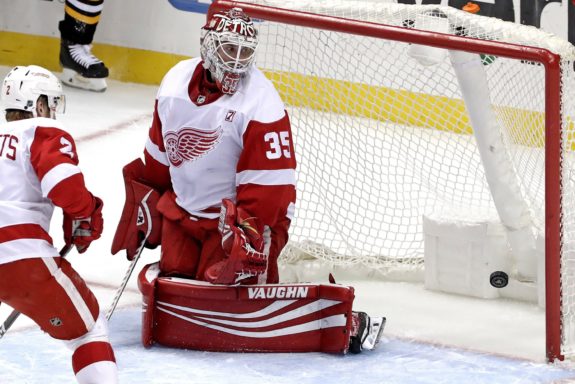
29) Edmonton Oilers
Forwards: 19
Defence: 28
Goaltenders: 28
Total: 75
ANALYSIS: Hockey isn’t basketball where one player can totally carry a team to the promise land — the Kawhi Leonard effect in Toronto, LeBron James pretty much anywhere he goes — but Connor McDavid will once again be taking the Oilers on his shoulders with hopes of lugging Edmonton back into the playoffs this season. McDavid is as close to a LeBron as there is in today’s NHL, so never say never. As long as he’s healthy, Edmonton has a hope — a faint hope, but a hope nonetheless. Surely, McDavid can lift the Oilers out of this lottery range in lieu of a supporting cast that is still well below average despite Ken Holland’s best efforts in his first offseason on the job as GM. Outside of McDavid — and Leon Draisaitl and Ryan Nugent-Hopkins — the Oilers’ roster remains very mediocre.

28) Columbus Blue Jackets
Forwards: 28
Defence: 11
Goaltenders: 31
Total: 70
ANALYSIS: Columbus lost a lot this offseason and didn’t recoup much, so expect the Blue Jackets’ forward momentum to come a screeching halt barring some last-minute (or in-season) miracles from Jarmo Kekalainen. Goaltending is a huge concern — at the very least a huge question mark — and it doesn’t look like this team is going to outscore the opposition on too many nights. The defence is a strength, but the weaknesses certainly outnumber the strengths for Columbus heading into this season.

27) Los Angeles Kings
Forwards: 27
Defence: 27
Goaltenders: 13
Total: 67
ANALYSIS: The Kings got bumped up a bit thanks to their goaltending, but that is assuming Jonathan Quick is staying healthy this season. That is never a safe assumption — he has an elastic band for a groin these days — so if Quick goes down, then Los Angeles would need Jack Campbell and Cal Petersen to carry the load. They were surprisingly solid last season — thus that ranking remained relatively high despite Quick’s injury risk — but last season was last season, and Los Angeles would likely hit the skids if Quick gets hurt again. The rest of the roster — the forwards and Drew Doughty, who seemingly stands alone on L.A.’s defence — couldn’t withstand the loss of their star goalie and would likely sink into lottery status.
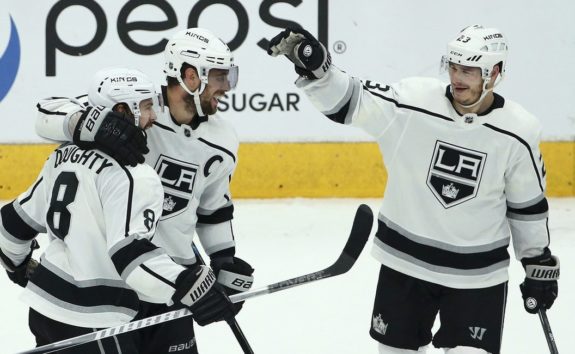
26) New York Islanders
Forwards: 26
Defence: 20
Goaltenders: 21
Total: 67
ANALYSIS: The Islanders’ roster is nothing special, but they do have a special coach in Barry Trotz — and a special coaching staff overall that features Lane Lambert, the defence guru, and Mitch Korn, the goalie whisperer. Those three, in particular, can turn a near-lottery team on paper into a potential contender as evidenced by the Islanders’ improbable playoff success last season after losing their franchise player in John Tavares without really replacing him. Much like the McDavid factor in Edmonton, the Islanders can’t be counted out as long as Trotz is working his magic. It’s much the same group — albeit with a significant change in goal, where Semyon Varlamov is replacing Robin Lehner — so expect the Islanders to overachieve again based on the talent level of their roster. Reality is, the whole is greater than the sum of its parts when it comes to the Islanders, which worked against them in these positional rankings.

25) Arizona Coyotes
Forwards: 24
Defence: 18
Goaltenders: 22
Total: 64
ANALYSIS: The Coyotes are gradually getting better and Phil Kessel is going to give them a real boost, but almost everything would have to go right for Arizona to make the playoffs. Even though the Pacific is still the weakest of the league’s four divisions, the Coyotes aren’t a top-three team on paper amongst their peers and they don’t look like a wild-card club either. Arizona is still average at best — and average at everything, at every position — so expect another small step forward, only to fall short again.
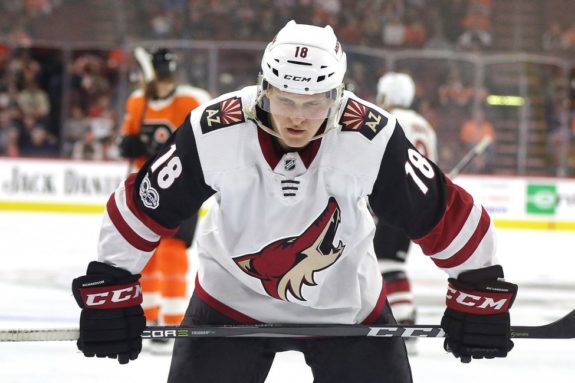
24) Anaheim Ducks
Forwards: 29
Defence: 24
Goaltenders: 8
Total: 61
ANALYSIS: The Ducks are trending down — and going into rebuild mode — but John Gibson’s goaltending props them up here. He can steal games and will again this season, just not enough to keep Anaheim relevant in terms of the playoff picture. This will be a transitional year under Dallas Eakins, with tempered expectations from Bob Murray. Hope for the best, brace for the worst, but expect something in the middle. Expect mediocrity.
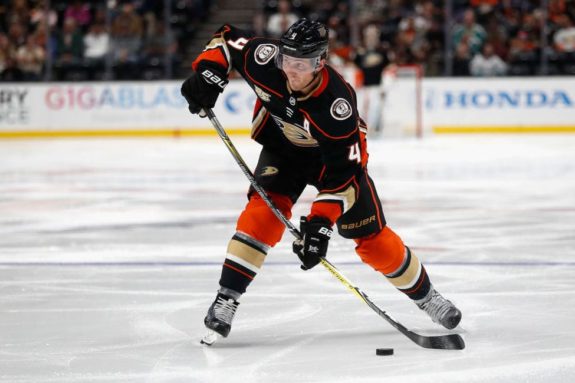
23) Colorado Avalanche
Forwards: 10
Defence: 25
Goaltenders: 26
Total: 61
ANALYSIS: The Avs are another team that could blow this ranking out of the water. Keyword is still “could” when it comes to Colorado because the defence is going to be young — with or without Bowen Byram — and the goaltending tandem is still relatively inexperienced too. Those realities hindered the positional rankings — and ultimately this power ranking — but the Avs are absolutely trending up and capable of building on last season’s playoff success. Colorado has plenty of firepower up front and should be able to overcome the odd defensive blunder or bad goal against. The forwards should power the Avs to the playoffs again.
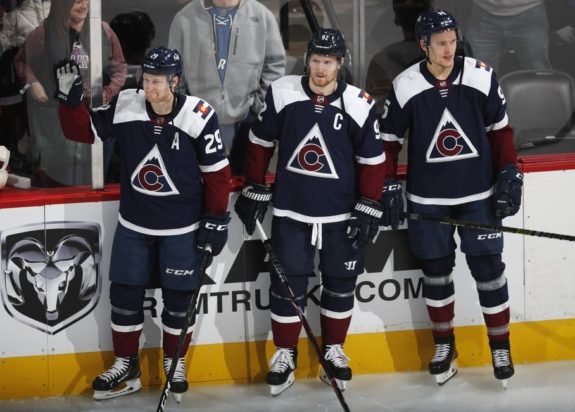
22) Minnesota Wild
Forwards: 23
Defence: 16
Goaltenders: 19
Total: 58
ANALYSIS: Minnesota seems so mediocre on paper — without many big names — but looks can be deceiving and don’t forget that Bruce Boudreau can work wonders. Pretty much everyone outside of Minnesota expects Colorado to be better, but Minnesota might not be bringing up the rear in that Central Division. The Wild are deep up front, still have one of the league’s better top fours on defence, and can rely on Devan Dubnyk to be decent in net. Being such a late hire, Bill Guerin probably wouldn’t be too upset with a top-10 pick to start his tenure — to build around for the next decade — but Boudreau probably won’t let that happen. He’ll get the most out of this group and perhaps push for a playoff berth.

21) Buffalo Sabres
Forwards: 18
Defence: 9
Goaltenders: 30
Total: 57
ANALYSIS: Ralph Krueger is going to maximize the potential of Buffalo’s forward group — you heard it here first — and Steve Smith is going to continue grooming the Sabres’ new-look blue line. Mike Bales will do his best with a goaltending tandem that leaves a lot to be desired as the weak link for this team on the rise. The Sabres are still a work in progress and Jason Botterill is going to have to deal from his position of strength on defence at some point, but he’s positioned Buffalo to finally be a playoff contender this season in the daunting Atlantic.
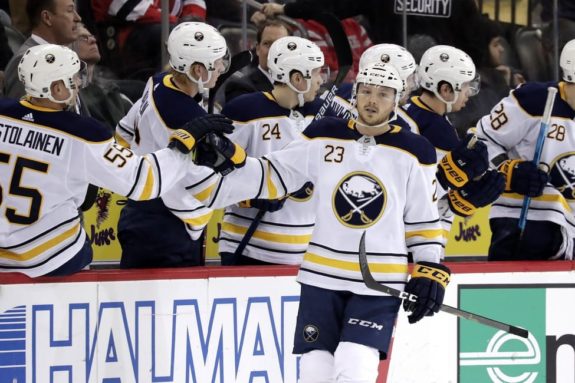
20) New York Rangers
Forwards: 21
Defence: 23
Goaltenders: 12
Total: 56
ANALYSIS: The Rangers rebuilt overnight — well, seemingly over a single offseason — and are now ready to compete again. That was quick, right? Being a desirable place to play definitely helped accelerate that rebuild, but credit Jeff Gorton, Chris Drury and even the newly hired John Davidson for landing the likes of Artemi Panarin and Jacob Trouba, Kaapo Kakko and Adam Fox. The list goes on for the new faces in New York’s young and exciting lineup. It’s been said before but bears repeating, the Rangers are going to be all kinds of fun to watch this season — regardless of the results, but don’t be surprised if they make a little noise in the Metro.

19) New Jersey Devils
Forwards: 11
Defence: 17
Goaltenders: 24
Total: 52
ANALYSIS: The Devils fell back to the pack last season — falling flat on their faces without Taylor Hall in the lineup for the second half — but they also fell into Jack Hughes with the first overall pick. Ray Shero had all kinds of luck and good fortune this offseason, getting P.K. Subban from Nashville, Nikita Gusev from Vegas, and Wayne Simmonds as a free agent. Those four should get New Jersey back into the playoff mix, with Subban instantly becoming the Devils’ No. 1 defenceman and the other three — Hughes, Gusev and Simmonds — potentially forming the team’s second line. All in all, things are looking up for New Jersey.

18) Vancouver Canucks
Forwards: 17
Defence: 19
Goaltenders: 14
Total: 50
ANALYSIS: The Canucks are heading in the right direction too, with recently extended Jim Benning trying to fast track Vancouver’s rebuild thanks to a few significant additions this offseason — namely Tyler Myers, J.T. Miller and Micheal Ferland. Those three will help shore up some holes, with the Canucks now looking solid at every position. Vancouver might not make the playoffs this season, but the future is bright for a team that continues to draft well. Benning has to stay the course from here and continue to develop that talent rather than trade it away, but his bosses — the Aquilinis — won’t want to wait too much longer for a return to the postseason and the revenue that comes with it.
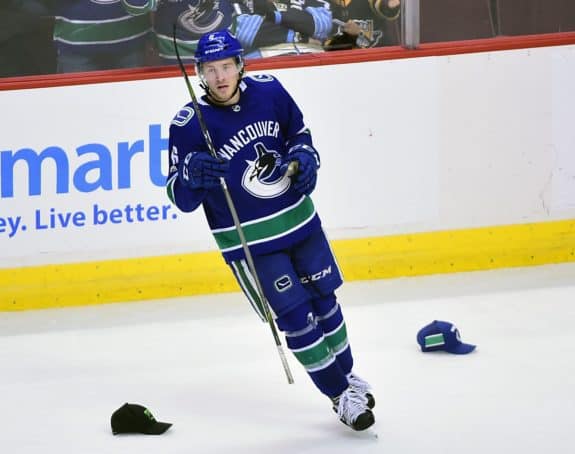
17) Winnipeg Jets
Forwards: 6
Defence: 26
Goaltenders: 16
Total: 48
ANALYSIS: The Jets’ defence took a big hit — losing Jacob Trouba, Tyler Myers and Ben Chiarot — so that will make life tougher for Winnipeg’s goaltenders. Fortunately, the Jets’ forwards should be able to outscore the opposition on a lot of nights, especially if Patrik Laine is scoring consistently. Perhaps some young defenders will rise to the occasion for Winnipeg, but that position could be holding the Jets back this season.

16) Carolina Hurricanes
Forwards: 20
Defence: 3
Goaltenders: 23
Total: 46
ANALYSIS: The Hurricanes overachieved last season — can we all agree on that? — but they should be trending up for the future. It was a perfect storm for Carolina last season and Rod Brind’Amour will be doing everything in his power to keep that Storm Surge going, though losing their on-ice leader — their captain Justin Williams — could have a negative impact. The defence will be a bit younger this season, but that won’t necessarily be a bad thing. The forwards will arguably be better — with the additions of Erik Haula and Ryan Dzingel — and the goaltending should be just as good with James Reimer replacing Curtis McElhinney behind Petr Mrazek. Don Waddell is benefitting from the foundation laid by Ron Francis, but Waddell was deserving of his extension for pushing this franchise forward with a few quality moves to date.
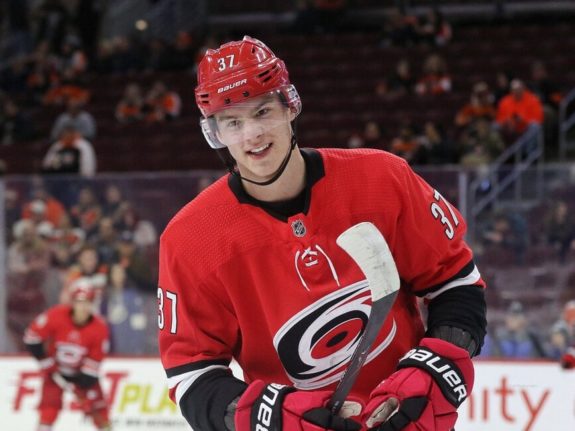
15) Calgary Flames
Forwards: 13
Defence: 6
Goaltenders: 27
Total: 46
ANALYSIS: The Flames would be higher with better goaltending — and Cam Talbot could totally rebound in Calgary — but that iffy position dropped them to the middle of the pack in these rankings. Calgary’s defence remains a strength and their forward depth is impressive too. Brad Treliving is returning a quality roster without making many changes this offseason, but the Flames are going to need more saves to make any progress.

14) San Jose Sharks
Forwards: 25
Defence: 1
Goaltenders: 20
Total: 46
ANALYSIS: The Sharks still rank in the top half of the league thanks to their defence — and particularly their big three of Brent Burns, Erik Karlsson and Marc-Edouard Vlasic. It doesn’t get any better than that. But San Jose’s forward depth in concerning — still without Joe Thornton and Patrick Marleau at the time of that ranking — and the goaltending is mediocre too. The Sharks need a return to form from Martin Jones and need a few new faces to step up in providing secondary scoring. San Jose does have some promising forward prospects, so that might not be too big of a problem — especially if Thornton and perhaps Marleau return to the fold.

13) Montreal Canadiens
Forwards: 22
Defence: 21
Goaltenders: 2
Total: 45
ANALYSIS: As long as the Canadiens have Carey Price — and that could be for a long time to come, with seven years left on his contract — they will have a chance at the playoffs. He is to Montreal what McDavid is to Edmonton — a game-stealer, the great equalizer, and a difference-maker unto himself. Price’s goaltending overshadows an otherwise average — or slightly below-average roster — and was the main reason for Montreal soaring up these rankings. However, if he gets hurt, it would be doom and gloom for the Habs.

12) Pittsburgh Penguins
Forwards: 3
Defence: 22
Goaltenders: 15
Total: 40
ANALYSIS: The Penguins have tweaked their forwards a ton over the last year and should see positive results from those changes despite parting with Phil Kessel. Pittsburgh still has Sidney Crosby and Evgeni Malkin, so scoring should continue to be a strength. The defence is concerning and appears problematic on paper — certainly the position that Jim Rutherford needs to shore up next — but the goaltending should be good as long as Matt Murray stays healthy. Pittsburgh will be extra motivated this season after getting swept by the Islanders in the first round, with Crosby leading a resurgence to avenge that embarrassment.

11) Chicago Blackhawks
Forwards: 14
Defence: 14
Goaltenders: 11
Total: 39
ANALYSIS: The Blackhawks are looking solid at every position, bringing a very balanced lineup into this season. Stan Bowman bolstered Chicago’s defence — acquiring Olli Maatta and Calvin de Haan — and brought back Andrew Shaw for added character. Bowman also signed Vezina finalist Robin Lehner to form one of the league’s better goaltending tandems with Corey Crawford. This roster better resembles the Chicago teams that won three Cups from 2010 to 2015. The core is older now, but they might have another run left in them for the Blackhawks.
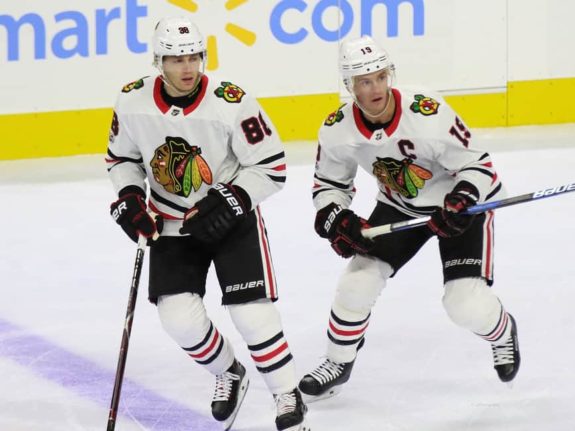
10) Vegas Golden Knights
Forwards: 4
Defence: 29
Goaltenders: 6
Total: 39
ANALYSIS: The Golden Knights weren’t able to add in the offseason — and had to subtract to stay cap compliant — but Vegas is still in great shape and continues to set the bar extremely high for Seattle in terms of expansion success. Marc-Andre Fleury is one of the league’s premier goaltenders and Vegas’ top two forward lines rank right up there too. The Golden Knights aren’t great on defence — at least not on paper — but that group gets the job done adequately in front of Fleury and there are some promising prospects on the back end. Only that defence ranking kept Vegas from being a top-five team in these power rankings.
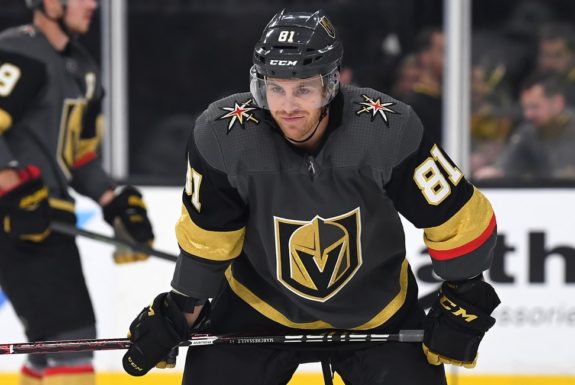
9) Philadelphia Flyers
Forwards: 8
Defence: 10
Goaltenders: 18
Total: 36
ANALYSIS: The Flyers will be pushing forward this season thanks to the additions of Kevin Hayes, Matt Niskanen and Justin Braun. Philadelphia is a much deeper team — both at forward and on defence — with those three joining the fold. The Flyers also hired three head coaches to form their new-look staff, with Alain Vigneault leading Michel Therrien and Mike Yeo. There will be an adjustment process but that much experience behind the bench should prove beneficial. Carter Hart is now the man in goal, backed up by Brian Elliott. Hart will likely endure some growing pains as a sophomore, but he’s a legit talent between the pipes. Chuck Fletcher might have turned the Flyers into a legit contender.

8) St. Louis Blues
Forwards: 12
Defence: 4
Goaltenders: 17
Total: 33
ANALYSIS: The Stanley Cup champion Blues enjoyed an improbable worst-to-first run last season and are positioned to contend again, with the potential to repeat. For that to happen, Jordan Binnington would have to repeat his heroics in goal over the course of his first full NHL season. St. Louis’ defence has long been a strength and the Blues have a quality forward group, so much of their success will depend on goaltending again. As long as Binnington stays solid — and doesn’t prove to be a flash in the pan like Andrew Hammond — then St. Louis should stay in the playoff mix in that stacked Central Division.

7) Florida Panthers
Forwards: 16
Defence: 12
Goaltenders: 4
Total: 32
ANALYSIS: The Panthers appear shockingly high in these power rankings since most don’t see Florida as a top-10 team as of today. That could change this season, with Joel Quenneville’s coaching and Sergei Bobrovsky’s goaltending. That’s not a knock against surefire Hall-of-Famer Roberto Luongo, but Bobrovsky is in his prime as one of the league’s best netminders. Quenneville’s influence and the addition of Anton Stralman should help the defence develop into a strength for the Panthers. The offence is decent despite losing out in the Artemi Panarin sweepstakes, settling for Brett Connolly as a consolation prize. With Panarin, Florida would have been a top-10 team. Without, the Panthers are probably still middle of the pack unless Quenneville makes that much of a difference, which he could.

6) Washington Capitals
Forwards: 9
Defence: 15
Goaltenders: 7
Total: 31
ANALYSIS: The 2018 champion Capitals are still a force to be reckoned with. From Alex Ovechkin to Braden Holtby to John Carlson, the key pieces are still in place at every position for at least another season. Holtby and top-line centre Nicklas Backstrom are both entering the final year of their contracts as pending unrestricted free agents next summer, so this could be the end of Washington’s window to win another Cup. Losing that coaching trio of Barry Trotz, Lane Lambert and Mitch Korn to the Islanders was a blow to the Capitals’ chances of repeating last season, but they should be ready to take another run now that they have regrouped under Todd Reirden, who was promoted from within as a rookie bench boss.

5) Dallas Stars
Forwards: 7
Defence: 13
Goaltenders: 10
Total: 30
ANALYSIS: The Stars might seem high in these power rankings, but remember this team took Stanley Cup champion St. Louis to double overtime in Game 7 before bowing out in the second round. Nobody pushed the Blues harder than Dallas. Jim Nill clearly feels the Stars are ready to win now based on his offseason moves in signing veterans Joe Pavelski, Corey Perry and Andrej Sekera to take a serious run in 2020. Dallas can make a case for a top-five forward group and Ben Bishop is capable of being a top-five goaltender when healthy, but the Stars’ defence is still developing and not overly deep beyond the big three of John Klingberg, Miro Heiskanen and Esa Lindell. Nill might need to tinker a little more on the back end, but the Stars are trending towards being a legitimate top-five team.

4) Boston Bruins
Forwards: 15
Defence: 8
Goaltenders: 3
Total: 26
ANALYSIS: The Bruins were this year’s runner-up, making it to the final thanks to terrific goaltending from Tuukka Rask, solid defensive play in front of him, and a top line that couldn’t be stopped for most of the playoffs. Don Sweeney is returning much the same group, which should keep Boston in the contender conversations. Whenever a team’s biggest concern is the third line, that typically bodes well for another successful campaign. And Bruce Cassidy arguably outcoached Mike Babcock in the playoffs, so Cassidy can now be considered more of a strength than a weakness for Boston going forward.

3) Toronto Maple Leafs
Forwards: 2
Defence: 7
Goaltenders: 9
Total: 18
ANALYSIS: The Leafs upgraded their defence — getting Tyson Barrie and Cody Ceci after previously acquiring Jake Muzzin, and with hopes of somehow still retaining Jake Gardiner — so Toronto’s perceived weakness is looking more and more like a strength for this season. The offence and goaltending were already among the league’s upper echelon, so Kyle Dubas managed to deliver what Mike Babcock needed and desired most. Last offseason, the Leafs’ defence wouldn’t have ranked in the top 15. Now, it’s No. 7 — and could crack the top five if Gardiner returns.

2) Nashville Predators
Forwards: 5
Defence: 5
Goaltenders: 5
Total: 15
ANALYSIS: The Predators aren’t going away despite their first-round exit. Nashville’s window-to-win is still wide open with the addition of Matt Duchene and the subtraction of P.K. Subban. That was a bold swap of sorts by David Poile, but he was manoeuvring from a position of strength to address a weakness. And even with that move, Nashville’s defence still ranks in the top five — down from No. 1 last year to No. 5 now — while the forwards moved up from outside the top 10 to No. 5. The goaltending is status quo and still a top-five tandem with Pekka Rinne being pushed by Juuse Saros. Turns out, Nashville is the fifth-best team across the board — at every position. The addition of Dan Lambert as an assistant coach should help spark Nashville’s power play and could provide the Predators with an offensive boost in general.

1) Tampa Bay Lightning
Forwards: 1
Defence: 2
Goaltenders: 1
Total: 4
ANALYSIS: The Lightning are the class of the NHL — and, to no surprise, are topping these power rankings. Getting top honours among goaltenders might be something of a surprise, but Andrei Vasilevskiy doesn’t get enough credit for his impact on Tampa Bay’s success. He’s overshadowed by all the forward firepower and the stellar defence, but Vasilevskiy is an all-world talent in his own right and deserving of that No. 1 ranking. Jon Cooper is one of the brightest coaching minds in the game — even if he had no answer for the momentum of John Tortorella and underdog Columbus this spring — so expect the Lightning to better pace themselves for the playoffs this season. And Julien BriseBois is doing just fine without Steve Yzerman, as evidenced by the bargain signings of Kevin Shattenkirk and Pat Maroon. Players want to win and Tampa seems like the place do it. Yes, the Lightning are still the Stanley Cup favourites for 2020 — at least according to these power rankings based on my positional rankings.

Recapping Power Rankings
Converting to Standings
If these power rankings were converted into standings, here is how the divisions and conferences would stack up, including playoff matchups and draft lottery odds.
NOTE: The number to the right of each team is their power ranking and the number in parenthesis is the total of their positional rankings.
Division Standings
Atlantic Division
1) Tampa Bay Lightning — 1 (4)
2) Toronto Maple Leafs — 3 (18)
3) Boston Bruins — 4 (26)
4) Florida Panthers — 7 (32)
5) Montreal Canadiens — 13 (45)
6) Buffalo Sabres — 21 (57)
7) Detroit Red Wings — 30 (86)
8) Ottawa Senators — 31 (90)
Metropolitan Division
1) Washington Capitals — 6 (31)
2) Philadelphia Flyers — 9 (36)
3) Pittsburgh Penguins — 12 (40)
4) Carolina Hurricanes — 16 (46)
5) New Jersey Devils — 19 (52)
6) New York Rangers — 20 (56)
7) New York Islanders — 26 (67)
8) Columbus Blue Jackets — 28 (70)
Central Division
1) Nashville Predators — 2 (15)
2) Dallas Stars — 5 (30)
3) St. Louis Blues — 8 (33)
4) Chicago Blackhawks — 11 (39)
5) Winnipeg Jets — 17 (48)
6) Minnesota Wild — 22 (58)
7) Colorado Avalanche — 23 (61)
Pacific Division
1) Vegas Golden Knights — 10 (39)
2) San Jose Sharks — 14 (46)
3) Calgary Flames — 15 (46)
4) Vancouver Canucks — 18 (50)
5) Anaheim Ducks — 24 (61)
6) Arizona Coyotes — 25 (64)
7) Los Angeles Kings — 27 (67)
8) Edmonton Oilers — 29 (75)
Conference Standings
Eastern Conference
1) Tampa Bay Lightning — 1 (4)
2) Toronto Maple Leafs — 3 (18)
3) Boston Bruins — 4 (26)
4) Washington Capitals — 6 (31)
5) Florida Panthers — 7 (32)
6) Philadelphia Flyers — 9 (36)
7) Pittsburgh Penguins — 12 (40)
8) Montreal Canadiens — 13 (45)
9) Carolina Hurricanes — 16 (46)
10) New Jersey Devils — 19 (52)
11) New York Rangers — 20 (56)
12) Buffalo Sabres — 21 (57)
13) New York Islanders — 26 (67)
14) Columbus Blue Jackets — 28 (70)
15) Detroit Red Wings — 30 (86)
16) Ottawa Senators — 31 (90)
Western Conference
1) Nashville Predators — 2 (15)
2) Dallas Stars — 5 (30)
3) St. Louis Blues — 8 (33)
4) Vegas Golden Knights — 10 (39)
5) Chicago Blackhawks — 11 (39)
6) San Jose Sharks — 14 (46)
7) Calgary Flames — 15 (46)
8) Winnipeg Jets — 17 (48)
9) Vancouver Canucks — 18 (50)
10) Minnesota Wild — 22 (58)
11) Colorado Avalanche — 23 (61)
12) Anaheim Ducks — 24 (61)
13) Arizona Coyotes — 25 (64)
14) Los Angeles Kings — 27 (67)
15) Edmonton Oilers — 29 (75)
Playoff Picture
Eastern Conference
A1) Tampa Bay Lightning vs. WC2) Montreal Canadiens
A2) Toronto Maple Leafs vs. A3) Boston Bruins
M1) Washington Capitals vs. WC1) Florida Panthers
M2) Philadelphia Flyers vs. M3) Pittsburgh Penguins
Western Conference
C1) Nashville Predators vs. WC2) Winnipeg Jets
C2) Dallas Stars vs. C3) St. Louis Blues
P1) Vegas Golden Knights vs. WC1) Chicago Blackhawks
P2) San Jose Sharks vs. P3) Calgary Flames
Draft Lottery Odds
1) Ottawa Senators — 31 (90)
2) Detroit Red Wings — 30 (86)
3) Edmonton Oilers — 29 (75)
4) Columbus Blue Jackets — 28 (70)
5) Los Angeles Kings — 27 (67)
6) New York Islanders — 26 (67)
7) Arizona Coyotes — 25 (64)
8) Anaheim Ducks — 24 (61)
9) Colorado Avalanche — 23 (61)
10) Minnesota Wild — 22 (58)
11) Buffalo Sabres — 21 (57)
12) New York Rangers — 20 (56)
13) New Jersey Devils — 19 (52)
14) Vancouver Canucks — 18 (50)
15) Carolina Hurricanes — 16 (46)
Feel free to disagree with those rankings and share your own
in the comments below.